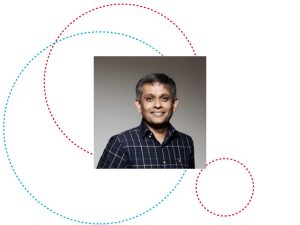Having been a part of SnT since its inception in 2009, Prof. Bhavani Shankar has been conducting research on signal processing for satellite communication systems and radar, among other applications. As of 1 January 2022, he now serves as the Head of the Signal Processing Applications in Radar and Communications research group (SPARC), where he leads a team of researchers in his specialty field.
With research interests including design and optimisation of MIMO communication systems, automotive radar and array processing, game theory and more, Shankar is a member of the Executive Committee of the IEEE Benelux joint chapter on communications and vehicular technology – and serves as editor for Elsevier Signal Processing. He was also a co-recipient of the 2014 Distinguished Contributions to Satellite Communications Award from the IEEE Communications Society. We sat down with him to learn about his research and career path.
Could you tell us about your background and how you came to research signal processing?
I specialised in signal processing during my Master’s in electrical communication engineering at the Indian Institute of Science. But it was when I published my first research paper in signal processing that I realised this was what I should be doing. That motivated me to undertake a Ph.D. in signal processing at the same institute, with the goal of one day becoming faculty.
Yet, life had other plans for me. Towards the end of my studies, I discovered that one of the requirements to becoming faculty was to have research experience abroad. My Ph.D. supervisor suggested I continue my research at Sweden’s KTH Royal Institute of Technology, so I left India with the goal of spending two years abroad and back. At KTH, I met Björn [Ottersten, Director of SnT, AN], and when he moved to Luxembourg to launch SnT in 2009, he asked me to join his research group in signal processing. Again, I thought I would spend a couple of years in Luxembourg finishing my postdoc, but I have been here ever since.
What do you like about research in signal processing?
The fact that it’s a complex challenge. It not only involves a lot of math, but also a practical, high-level overview of system design. We need to understand the purpose of the system, look at how signals are transmitted, received, and interpreted at a system level in order to meet the purpose efficiently. This involves extremely precise modelling and measurements that are affected by many factors: the very design of the system, the devices and materials used, their electromagnetic interference, power supply, latency – it’s like putting together an intricate puzzle of theoretical and practical knowledge, with extremely high stakes, such as people safety, for example. If this is not a worthy challenge, I don’t know what is.
What is your favorite career highlight so far?
Working with Björn and obtaining the ERC grant for the AGNOSTIC project is my favorite career highlight. Björn’s idea was interesting, and as we started it was just that: an idea. Putting together all the pieces, obtaining the right input and framing it in a way that would do justice to the underlying research question was very challenging. It was also the first time I was exposed to the ERC grant [the project went on to receive an additional ERC grant, a POC this time, in 2020, AN].
What are you looking to achieve through your work?
At the moment I am really looking to build up my group, and together with them explore high-stakes research questions, create opportunities and innovation, as well as get involved in increasingly bigger technical challenges. My goal is to build a centre of excellence in signal processing, and see our doctoral students go on to make a name for themselves. Ultimately though, I want my team’s work to speak for itself – and impact the entire signal processing community.
What is the most rewarding thing about about your work?
The most rewarding thing for me still is the publication of a paper. It doesn’t matter if it’s a conference or a journal, it’s always something on which my team and I worked hard and spent a lot of time on, and in that moment it just pays off. That’s very rewarding, and I enjoy every opportunity to publish with my team.
What kind of projects will you be setting your sights on?
I am working on multiple aspects. One of them is consolidating our industrial partnerships. My team can help companies achieve their goals as we explore questions in applied research, so it’s a win-win for everyone. Another aspect is fundamental research: in that regard, we are applying to some FNR and international grants, such as Horizon 2022. Concerning the topics, we are specifically looking at new applications of radar signal processing, especially in the fields of biomedicine and weather radar. Also, my team is continuing to work on our ERC POC grant – we had a lot of developments on that side, with a steady flow of patents being filed. Long-term, we might eventually be looking at creating a spin-off. One of my former Ph.D. students already created a spin-off of SnT, Databourg, so hopefully we’ll continue that tradition.
